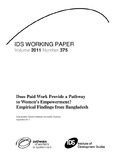| dc.description.abstract | The debate about the relationship between paid work and women’s position within the family and society is a long-standing one. Some argue that women’s integration into the market is the key to their empowerment while others offer more sceptical, often pessimistic, accounts of this relationship. These contradictory viewpoints reflect a variety of factors: variations in how empowerment itself is understood, variations in the cultural meanings and social acceptability of paid work for women across different contexts and the nature of the available work opportunities within particular contexts. This paper uses a combination of survey data and qualitative interviews to explore the impact of paid work on various indicators of women’s empowerment ranging from shifts in intra-household decision-making processes to women’s participation in public life. It finds that forms of work that offer regular and relatively independent incomes hold out the greater transformative potential. In addition, it highlights a range of other factors that also appear to contribute to women’s voice and agency in the context of Bangladesh. | en_US |

